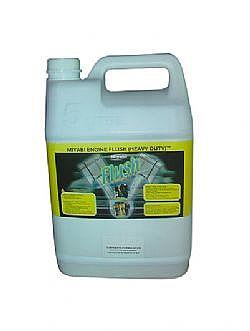SLUDGE, gums and carbon deposits build up over time on the internal surfaces of engines. An effective engine flush can remove these deposits and significantly reduce exhaust pollution, create a more efficient engine, boost power, improve fuel consumption and generally reduce running costs.
However there are a number of engine flushes currently on the market which claim to be efficient. So the following are the important points to consider when making your choice:
• Is the product really efficient? Can its efficiency be visually and scientifically proven?
• Will it damage the engine?
• Will it deliver a fuel saving (up to 10 percent)?
• Has it been tested by internationally recognised laboratories?
• Is it environmentally friendly? Does it contain hazardous and toxic chemicals?
• Once treated with engine flush, does the oil present a further hazard during disposal?
• Does it have a pH near neutral (seven)?
• Is it simple to use and administer?
• Can it be used in all engines (petrol, diesel, LPG modified, etc) and on cars, trucks, earthmoving machinery, ships and trains?
• Will it help the environment by reducing particulate matters and ‘black’ smoke (20 to 40 percent)?
• And most importantly, is it economical?
Miyabi Engine Flush meets all of the above points. The product is derived from the same technology and know-how as the well-proven Miyabi oil spill dispersants. It is formulated and enhanced specifically to remove the gum, sludge and particles within a combustion engine. With an almost neutral pH level it does not react with any mechanical parts, rubber hoses or gaskets of
the engine.
Miyabi Engine Flush, with its oil-compatible (lipophilic) properties acts on the jelly-like sludge and gum within the engine’s oil sump and circulating system. When kinetic energy (ie running the engine for about 30 to 45 minutes) is applied to a lubricating system containing the engine flush, the sludge and gum softens and breaks down into an emulsified oil mixture. This is drained off and the engine oil filter replaced.
The result is a properly cleaned lubricating system ready to receive new oil. Subsequent benefits include fuel savings of up to 10 percent or more, improved combustion, a more responsive and powerful engine, reduced engine noise and vibration, an increased engine lifespan, plus smoke emission and pollution reduced by up to 40 percent.
On a large fleet of vehicles or machinery, the combined savings are considerable.
However there are a number of engine flushes currently on the market which claim to be efficient. So the following are the important points to consider when making your choice:
• Is the product really efficient? Can its efficiency be visually and scientifically proven?
• Will it damage the engine?
• Will it deliver a fuel saving (up to 10 percent)?
• Has it been tested by internationally recognised laboratories?
• Is it environmentally friendly? Does it contain hazardous and toxic chemicals?
• Once treated with engine flush, does the oil present a further hazard during disposal?
• Does it have a pH near neutral (seven)?
• Is it simple to use and administer?
• Can it be used in all engines (petrol, diesel, LPG modified, etc) and on cars, trucks, earthmoving machinery, ships and trains?
• Will it help the environment by reducing particulate matters and ‘black’ smoke (20 to 40 percent)?
• And most importantly, is it economical?
Miyabi Engine Flush meets all of the above points. The product is derived from the same technology and know-how as the well-proven Miyabi oil spill dispersants. It is formulated and enhanced specifically to remove the gum, sludge and particles within a combustion engine. With an almost neutral pH level it does not react with any mechanical parts, rubber hoses or gaskets of
the engine.
Miyabi Engine Flush, with its oil-compatible (lipophilic) properties acts on the jelly-like sludge and gum within the engine’s oil sump and circulating system. When kinetic energy (ie running the engine for about 30 to 45 minutes) is applied to a lubricating system containing the engine flush, the sludge and gum softens and breaks down into an emulsified oil mixture. This is drained off and the engine oil filter replaced.
The result is a properly cleaned lubricating system ready to receive new oil. Subsequent benefits include fuel savings of up to 10 percent or more, improved combustion, a more responsive and powerful engine, reduced engine noise and vibration, an increased engine lifespan, plus smoke emission and pollution reduced by up to 40 percent.
On a large fleet of vehicles or machinery, the combined savings are considerable.






